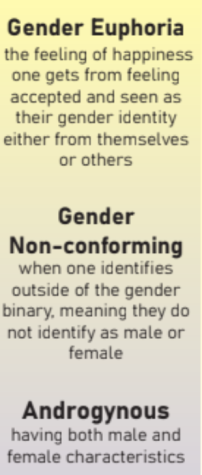Pronouns: The How And The Why
May 27, 2022
 How can such little words make such a big impact? For non-binary people, personal pronouns can really matter. Because personal pronouns involve gender (“she” typically being female, “he” being male,) using the pronouns that someone prefers can be important to affirming their gender. On the other hand, when people refuse to use non-binary individuals’ pronouns, harm can be inevitable
How can such little words make such a big impact? For non-binary people, personal pronouns can really matter. Because personal pronouns involve gender (“she” typically being female, “he” being male,) using the pronouns that someone prefers can be important to affirming their gender. On the other hand, when people refuse to use non-binary individuals’ pronouns, harm can be inevitable
For many non-binary people, they/them pronouns work best. While those pronouns are also used to refer to multiple people at once, the gender-neutral use of they/them pronouns to refer to a singular person dates back as far as 1386, when it was first seen in English literature. When someone identifies as non-binary, they may not want to use he/him or she/her pronouns because those pronouns could suggest they identify with a gender that they really do not.
Many others use a combination of pronouns, such as he/they or they/she. These combinations can indicate that someone is comfortable with multiple sets of pronouns, or that they would like to use gender-neutral pronouns but also are okay with gendered ones. When you encounter someone who uses multiple pronouns, it is best practice to try to incorporate each pronoun in different discussions involving that person. For example, one day you might say “Did Ryan pick up their things?” in one conversation, and “I thought Ryan would be back by now, where is she?” in another. Also, be sure to ask people how they prefer that you use their pronouns; each person’s experience is unique and deeply personal, so taking care to respect each person’s preferences can be validating.
One additional type of pronouns that people have used for decades are called neopronouns. These include pronouns that go beyond he/she/they, such as ze or e. People use these pronouns as an alternative to the options that exist in conventional English because that conventional language may not include pronouns that reflect how they feel.
Pronouns matter because their usage can impact the experiences of gender non-conforming people around you. And for some, it could even impact their mental health and their life as a whole.